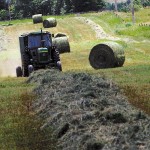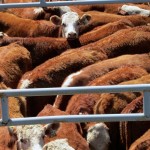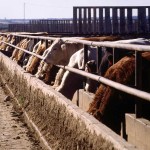Last month we looked at the relationship between forage quality and plant maturity. Our focus was on how fibre levels increase with advancing plant maturity and the resulting negative influence on nutritive value of the forage. A second factor that has a negative impact on forage quality is the reduction in crude protein content that […] Read more
Something More to Think About!

Something to think about!
At what stage should you cut your hay for optimum forage quality?
Feed, particular the cost of putting up preserved forage is one of the largest factors influencing the cost of maintaining the cow herd. In cost-of-production studies carried out by the Western Beef Development Centre, winter feed costs over a five-year period averaged 30 per cent of total cow costs and in some cases reached 50 […] Read more

With calves at $2 — attention to detail pays dividends!
Early in the new year, I was at a local beef meeting where a group of cattlemen was discussing what they see as an issue with spring calving, that being a small but nevertheless disturbing increase in the number of open cows in the fall. The discussion included producers, extension specialists and researchers and focused […] Read more
A midterm checkup for your feeding program
For cattle feeders this is a great time of the year. Cattle are well into their feeding program, health issues are in the rear-view mirror and your nutrition program is running flawlessly. If you are wondering what world I live in, you are right. Life is never this simple. However, with current profitability in the […] Read more

Supplementing Vitamins A, D and E to beef cattle
Vitamins like minerals are essential nutrients for cattle. As a group, they are involved in all aspects of the animal’s metabolism including growth, reproduction and health. There are two general classes of vitamins. These include the water-soluble and fat-soluble vitamins. The water-soluble ones include the B vitamins and vitamin C. Fat-soluble vitamins include A, D, […] Read more
Feed the rumen first: Part 2
Last month we discussed the dynamics of rumen fermentation and the contribution that rumen microbes, particularly bacteria make to the nutrition of cattle. For those of you who missed that column, I will summarize by stating that achieving a desired level of performance whether we are dealing with a bred cow or a finishing steer depends to a large extent on how […] Read more
Feed the rumen first!
Beef producers often have questions on the relative feed value of the different forages, grains and byproduct feeds they have access to. Many of these questions centre on energy and protein content, how much to feed and what type of supplement, if any is required. Understanding relative feed value and the need for specific supplements […] Read more
The role of technology in the efficient production of wholesome beef
Nutrition with John McKinnon
I recently had the opportunity to do a series of producer meetings in southern Alberta and was reminded about the important role that technology such as growth implants and feed additives play in our industry. In light of the marketing hype that some national chains are using to influence the consumer’s perception about the wholesomeness […] Read more
Feed Wheat
In this column, I have talked a lot about alternative feeds. While I believe byproduct feeds have their place, chances are if you are backgrounding or finishing cattle, your feeding program is centred on barley or corn. Some of you may however be tempted to feed wheat this winter, so to avoid any surprises, let […] Read more
Feed Wheat
In this column, I have talked a lot about alternative feeds. While I believe byproduct feeds have their place, chances are if you are backgrounding or finishing cattle, your feeding program is centred on barley or corn. Some of you may however be tempted to feed wheat this winter, so to avoid any surprises, let […] Read more



